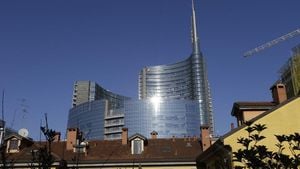Antisemitism, the enduring prejudice against Jews, has been witnessing alarming spikes across the globe, igniting fears and prompting serious conversations among Jewish communities. The surge follows pivotal events, particularly the October 7, 2023, Hamas-led attack on Israel, which heightened tensions and sparked widespread protests and political discourse—sometimes laced with overtly antisemitic sentiments.
Just weeks after the attacks, reports revealed the rise of antisemitism as the most urgent issue for Jews living around the world. From campus environments to public protests, incidents surged, resulting in many asking whether staying put was worth the risks involved.
For example, at the University of Toronto (U of T), reports indicated over 400 antisemitic incidents since October 7. Graffiti featuring swastikas and threats against Jewish students heightened fears within the campus community. Jenn Ferman, the Senior Campus Director at Hillel U of T, stated the organization recorded “a staggering 11 times increase in reports of antisemitism across our nine campuses.” This statistic dovetails with findings from Statistics Canada, which pointed out Jews were targeted in 70 percent of Canada’s reported religiously motivated hate crimes.
Similar patterns emerged globally, particularly sharp spikes were noted across Australia—where antisemitic incidents quadrupled post-October 7, rising from 495 incidents to over 2,000. Among the more distressing events, Australian Jews reported being assaulted, verbally harassed, and otherwise targeted during public protests. Some high-profile incidents included protestors chanting, “F— the Jews” near iconic sites such as the Sydney Opera House, rattling the local Jewish community.
Shira Li Bartov, reporting for the Jewish Telegraphic Agency, outlined the circumstances surrounding such events, illustrating how the political climate indirectly fueled hostility against Jewish individuals. The Executive Council of Australian Jewry noted physical assaults against Jews surged significantly, up to 65 from just 11 the previous year.
This accentuation of hostility is not merely coincidental; it correlates with growing anti-Israel sentiments which have seeped deep within various societal fabrics worldwide. Conversations about Jewish identity, belonging, and safety became more pertinent as many members of the Jewish community began questioning their place in societies they previously thought of as home.
President Isaac Herzog, during discussions with Australian Jews, encapsulated the sentiment of many: he emphasized the necessity for communities to secure Jewish life free from harassment. He stated, “this initiative feels more urgent than ever,” advocating for collective engagement to confront antisemitism. Such sentiments echo loudly among American Jews, who are facing similar surges of hate after the same triggering event of October 7.
Within the United States, the Anti-Defamation League reported it marked a distinct rise, with three times more antisemitic incidents documented over the year following the attacks when compared to the same timeframe prior. Streets filled with aggressive protestors often bore hateful cartoon depictions and slogans targeting Jewish people, fueling existing fears within the community.
Meanwhile, back on Canadian campuses like U of T, Jewish students felt increasingly isolated. Ron Ulitsky, part of the U of T Student Union, remarked on the urgent need for institutional accountability, stating, “the University will only act if its lawyers believe they are on solid legal footing.” The hesitance of administration to address incidents adequately left many feeling neglected and unsupported.
Further complicity lies within how discourse about Israel escalates tensions. Ryn Van Leeuwen, another U of T student stated, “The way antisemitism has flourished reflects not only the campus environment but the wider society’s narrative. Too often, professors and classmates—rather than being allies—lecture students on what they should feel or believe about antisemitism.”
This shifting dialogue poses the question, how should Jewish communities respond to such treacherous conditions? Should they stay and fight against what seems like insurmountable hostility or seek new havens, such as Israel, where their identity is not just recognized but celebrated? Jonathan Lieberman interrogated this dilemma aptly, stating, "Is it worth fighting to stay in a country where you’re not wanted?" as he reflects on the resilient Jewish identity and the potential desire for migration.
Hart has expressed dual waves of sentiment within the community; one urges steadfastness against rising hate and the other contemplates whether it makes sense to leave environments increasingly deemed hostile. Germany has witnessed petitions aimed at addressing antisemitism, indicating how deeply rooted the issue is within many European nations as well. Yet, calls for solidarity and action have often resulted in public denouncement, leaving Jewish individuals feeling trapped between defending their heritage and seeking safety.
There’s also the pressing attention on schools and educational institutions, where young seekers of knowledge often become unwitting targets for hate. Increasingly, universities are facing scrutiny over how well they protect students from hate speech and antisemitic actions. The narrative shifts from merely policing campuses post-event to creating proactive dialogue around education aimed at preventing such developments altogether.
The Jewish community has found solidarity not only within but also seeks the support of allies willing to educate and stand against hate. The Alliance for Israel Advocacy, for example, has increasingly mobilized students to create spaces where Jewish voices are heard, respected, and valued. This proactive engagement hopes to create atmospheres where divisive narratives can be countered with compassion and factual discourse.
On the global stage, Jewish organizations are convening to discuss strategies for addressing antisemitism at multilateral forums, seeking to amplify their voice and call for prominent policy changes. This doesn’t come without challenges; popular narratives today seem readily dismissive of the historical traumas and struggles faced by the Jewish community, often reshaping their identity around current geopolitical conflicts.
Despite these challenges, many within the community are rallying to protect their heritage and rights. Various reports document grassroots movements across multiple countries, where individuals have engaged with local communities to educate them and combat the generalizations and stereotypes proliferated online and offline.
Continued advocacy leads to initiatives aimed at fostering resilience, collectively striving to forge new identities shaped by solidarity and mutual respect. The optimism within the community remains as conversations about policy reforms continue to emerge around legislation aimed at combating hate crimes effectively.
Looking forward, Jewish communities must decide on strategies for both reforming their present environments and possibly anchoring new paths forward. The challenging balance between asserting their place amid rising antisemitism, engaging thoughtfully with allied groups, and nurturing their communal identity stands as unforgiving as it is valuable.
Through advocacy, resilience, and community solidarity, they may find new ways to combat hate and work toward creating environments where they can thrive without fear or persecution.



